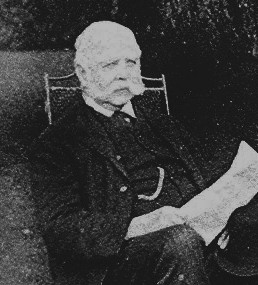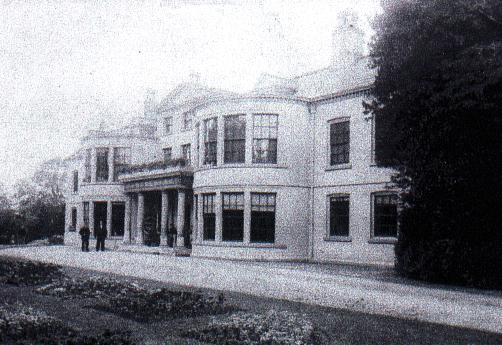One of the leading
members of the Bourne bench of magistrates during the late 19th century was Lieutenant Colonel William Parker who lived at Hanthorpe village, three miles north of Bourne. He had previously lived at Grantham and had inherited the family home, Hanthorpe
House, from his father William Parker, who was known locally as the squire until his death in 1883 at the age of 91.
He originally lived at Swayfield with his wife
Anne,
daughter of John Bullivant of London, who he had married in 1817, where his oldest son William was born in
1824, but by 1835 they were in residence at Hanthorpe House, a large 18th
century country mansion where the household became the centre of activity and employment in the vicinity. He
became a deputy lieutenant of the county and in 1864, was appointed High
Sheriff and soon became established as one of the principal landowners in the district, along with the Marquess of Exeter and Lord Aveland, and by 1885 the house was described as "a handsome and pleasantly situated mansion".
When Parker died, he was buried in the family vault in Morton churchyard on Tuesday 1st May 1883 and on the following Friday, a revealing insight into his character was published by the Stamford Mercury. It said: As a young man, he took up the business of a land valuer and similar useful employments, and aspiring to the appointment of high constable, he was rejected by the magistrates of that Bench over which he afterwards occasionally presided: but he was little known beyond his immediate neighbourhood until he appeared in the papers as the writer of a series of letters against the Black Sluice Commissioners in or about the year 1846, the strong language and acerbity of which will be well remembered by many persons. To prove the sincerity of his ideas, he opposed in Parliament the Bill which that influential body were then promoting - an opposition which entailed upon the Trust a loss of more than £10,000; but his own losses were never known. Failing entirely in his opposition, he bore no malice, but at once with extraordinary pluck and versatility worked not only heartily with the Commissioners, but prominently solicited subscriptions for a testimonial for their clerk, whom he had so recently denounced as the worst of a "perjured crew". Mr Parker's peculiar idiosyncrasy led him to take up with the greatest warmth any cause he temporarily adopted and to oppose the other side with words of unusual strength and significance, and when he imagined himself in the right he would assail his former friends with as little reluctance as he did his older opponents. In the year 1857, being annoyed with Sir John Trollope, who at that time represented South Lincolnshire, he suddenly took up the Liberal side and declared himself "thorough going", but at the next election he rejoined his former friends. His generally courteous manner was remarkable, and he was often known to show great kindness and liberality, especially towards his tenants, and it is much to be regretted he occasionally allowed the warmth of his feelings to carry his pen into excess of language and vituperation which more or less alienated from him many old friends, and which greatly impaired his intended usefulness. Latterly he thought himself called upon to act as a champion of Protestantism, and made it his duty to attack with his pen all those whose proclivities he thought tended to be a more ornate ritual; and for the last two or three years he had entertained the notion that his old allies, the Black Sluice Commissioners, were acting wrongfully about some scheme of drainage, and he vigorously brought to bear upon them letters and pamphlets couched in the strongest denunciations that either the Bible or Shakespeare could supply, and with a doubtless honest, but quixotic zeal, worthy of a better cause, he did not spare any one, Mr Chaplin, Mr Lawrance and Captain Smith coming in for censure in a most uncompromising manner, but it redounds to the honour of those gentlemen that they abstained from entering into a paper war, or of replying to the frequent challenge held out to them, and that their better sense enabled them to respect the vigour of a nonagenarian, and to smile at and excuse the erroneous impressions the infirmities of age are apt to engender. After his death, the house was taken over by his son, William. He had been educated at Eton and Exeter College, Oxford, and was a staunch Conservative and a lively supporter of the local party but he was also a soldier and had been a major, then lieutenant-colonel with the old Royal South Lincoln Militia and served for many years as commanding officer of the Bourne Company of Volunteers, succeeding Captain, later Sir John Lawrance, in 1854. During his period of command, Colonel Parker took great interest in improving the efficiency of his men until 1873 when he was obliged to resign because no officer was allowed to hold commissions in two forces and he remained as an honorary officer with the militia. In 1855, he married Augusta Millet Hariott Short, the second daughter of Lieut Colonel C W Short of the Coldstream Guards. The 1891 census, when William was 67, shows that his wife Harriet Augusta, aged 58, was also living there together with two daughters, Flora and Katherine, who were both in their twenties, two grandsons, William, aged 6 and George Marcus, aged 5, and a guest as well as a retinue of servants including a cook, lady's maid, parlour maid, housemaid, under housemaid, kitchen maid and nurse. They also employed grooms, footmen, gamekeepers, gardeners, coachmen and a butler.
Colonel Parker continued the family tradition of supporting the village church and according to a newspaper report of the time: "He had been all his life a devoted member of the Church of England, and as long as health and strength permitted, was a shining example to all her members, as was evidenced by his regular and constant attendance at all her ordinances in all weathers." He died on 12th May 1909 after a long illness at the age of 85, and his funeral was therefore an important occasion. The family mourners and the coffin were met at the churchyard gate by the choir, headed by the processional cross, which then wended its way into St John Baptist Church where the pews were packed for a choral funeral service conducted by two ministers, the Rev N C Marris, Vicar of Morton, and the Rev Canon W W Layng, Rector of Rippingale. Afterwards, he was buried in the churchyard where the choir assembled around the graveside and sang Jesus lives, no longer now.
See also Hanthorpe Hanthorpe House Morton Morton church in past times Poaching in the 19th century
Go to: Main Index Villages Index |


